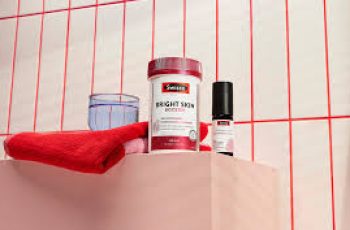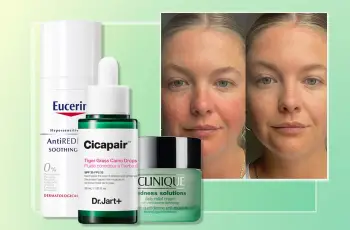
How to Reduce Sebum Production Internally: A Comprehensive Guide
Excessive oiliness can be a major skin concern, particularly for those with acne-prone or very oily skin types. While topical treatments and skincare routines are commonly discussed, a less explored area is reducing sebum production internally. Is it truly possible to influence how much oil your skin produces from the inside? Can changes in your diet, hormones, supplements, or even your daily habits make a difference?
In this guide, we’ll explore the science behind internal sebum regulation—covering everything from food and vitamins to hormonal influences and prescription medications. But before diving in, it’s worth asking an important question:
Do You Actually Have Oily Skin?
You might think you have oily skin, but studies have shown that more than 80% of people overestimate their sebum production. This is significant because treating skin that isn’t truly oily with oil-control products can lead to irritation, dehydration, or even more breakouts.
Before trying to reduce sebum production, it’s important to accurately identify your skin type. Tools like the Baumann Skin Type Indicator or consultations with a dermatologist can provide valuable insight.
What Is Sebum and What Influences Its Production?
Sebum is an oily, waxy substance secreted by sebaceous glands in the skin. It plays a crucial role in skin health by lubricating the skin and protecting it from friction and environmental damage. However, excessive production can contribute to acne, clogged pores, and shiny, greasy-looking skin.
Sebum production is influenced by several internal factors, including:
Genetics
Hormones (especially androgens like testosterone)
Diet and nutrition
Certain medications and supplements
Let’s break down each of these areas, starting with what you put on your plate.
Can Diet Influence Sebum Production?
The connection between diet and skin has long been debated. While diet is not the sole determinant of sebum production, it can play a role—albeit a small one. Here’s what current research says:
1. Low Glycemic Diets
Low glycemic diets are popular for managing acne, but they may not help reduce sebum. In fact, studies have shown that a low glycemic diet may increase the ratio of monounsaturated to saturated fatty acids in the body, potentially leading to increased sebum production.
In a 12-week study, a low glycemic diet increased monounsaturated fats, which are associated with increased sebum secretion.
While this can be beneficial for dry skin types, it might not help those with oily skin.
Conclusion: A low glycemic diet might not be the best approach for oily skin, even though it’s often recommended for acne.
2. Saturated vs. Unsaturated Fats
According to a 2008 study by Smith et al., increasing saturated fats in the diet may reduce sebum production. However, this effect hasn’t been replicated in larger studies. Additionally, diets high in saturated fat carry other health risks, such as increased LDL cholesterol and heart disease.
Recommendation: Instead of ingesting large amounts of saturated fat, opt for topical moisturizers with saturated fatty acids—though these may be too heavy for oily skin types.
3. Vitamin A in Food
Vitamin A has a well-established role in reducing sebum production, especially in the form of pharmaceutical retinoids. But can you get enough from food?
A 2003 study showed that a 4.8% increase in blood Vitamin A levels from diet led to only a 1.4% decrease in sebum production.
While that’s a measurable impact, it’s quite modest and may not make a significant difference on its own.
Foods Rich in Vitamin A:
Carrots
Kale
Spinach
Broccoli
Milk
Eggs
Beef Liver
Mango
Cantaloupe
Bottom Line: A Vitamin A-rich diet can support healthy skin but isn’t a standalone solution for oily skin.
Supplements and Vitamins for Sebum Control
Vitamin A Supplements
When used in supplement form, Vitamin A (as retinol or retinoic acid) can be more effective in reducing oil production than food alone. However, this comes with a caveat:
Vitamin A is fat-soluble, meaning it accumulates in the body and can reach toxic levels.
Symptoms of Vitamin A toxicity include liver damage, hair loss, dry skin, and even birth defects in pregnant women.
The RDA (Recommended Daily Allowance) is:
2,700 IUs/day for women
Never exceed 10,000 IUs/day without medical supervision
Best Practice: Use topical retinoids for direct skin benefits and consult a doctor before considering oral Vitamin A supplements.
Other Supplements?
At this time, no other supplements have been clinically proven to significantly reduce sebum production. Zinc and omega-3 fatty acids are often suggested for acne but do not directly impact sebum output.
Medications That Reduce Sebum Production
If you’re struggling with persistently oily skin, especially if accompanied by moderate to severe acne, a prescription medication may be an appropriate route.
Retinoids (Oral Vitamin A Derivatives)
Medications like isotretinoin (Accutane) are among the most powerful treatments for reducing sebum production. These are only available by prescription and require medical supervision due to potential side effects.
Used for severe acne or when other treatments fail
Can significantly decrease sebaceous gland size and activity
Requires lab monitoring due to potential liver and lipid changes
Hormonal Treatments
Sebum production is heavily influenced by androgens, especially testosterone. Here are two classes of drugs that reduce sebum by lowering testosterone activity:
1. 5-alpha reductase inhibitors (e.g., Finasteride/Propecia)
These block the conversion of testosterone into its more active form (DHT)
Commonly used for male pattern baldness but may affect skin oil levels
2. Spironolactone
Often prescribed for women with hormonal acne or PCOS
Blocks androgen receptors and reduces oil production
Can be highly effective but may cause side effects like menstrual irregularities
Important: These medications should only be used under a physician’s supervision and may not be suitable for everyone.
The Role of Hormones in Sebum Production
As mentioned above, testosterone and other androgens stimulate sebaceous glands. Factors that can increase testosterone and thereby sebum include:
Intense physical training
Certain supplements (e.g., DHEA, creatine, testosterone boosters)
Medical conditions like PCOS
If your oily skin developed after starting a supplement or fitness regimen, it may be worth exploring hormonal links.
Lifestyle and Sebum Production
Stress
Contrary to popular belief, stress does not directly increase sebum production. However, stress can still impact your skin:
Stress hormones like cortisol can impair skin barrier function
Stress may indirectly cause acne flares due to inflammation, not excess oil
Fragrances
A 2008 study suggested that certain fragrances might influence sebum output, but the data was inconclusive. No specific fragrance ingredients were identified, and the study hasn’t been replicated.
Green Tea
A few studies suggest that green tea, when consumed orally, may help reduce sebum production. However:
Topical green tea is far more effective
It contains polyphenols like EGCG that help regulate sebum at the gland level
Our recommendation: Try skincare products that include green tea extracts—especially moisturizers or serums formulated for oily skin.
Topical Products and Skincare Routine
Reducing sebum internally is only part of the equation. You’ll see the best results when internal strategies are paired with an effective skincare routine tailored for your unique skin type.
Product Recommendations:
Essopi Antioxidant Cream: Contains 15% monounsaturated fatty acids and green tea. Great for oily or combination skin.
Topical retinoids (e.g., tretinoin, adapalene)
Oil-free moisturizers and non-comedogenic sunscreens
To build a personalized regimen, consider identifying your Baumann Skin Type, which evaluates your skin across multiple dimensions like oiliness, sensitivity, pigmentation, and aging.
Final Thoughts: What Actually Works?
While it’s difficult to drastically reduce sebum production through diet or supplements alone, there are internal interventions that can help—especially prescription medications and hormonal therapies. Combining internal methods with the right topical products creates a more comprehensive, sustainable solution for oily skin.
Key Takeaways:
Diet has a limited effect on sebum, but avoiding certain fats and including Vitamin A-rich foods can help.
Topical and oral Vitamin A derivatives are the most effective.
Hormonal regulation (via medications like spironolactone or finasteride) can significantly reduce oil production.
Green tea, especially when used topically, shows promise.
A well-balanced skincare routine is essential for managing oily skin long-term.


